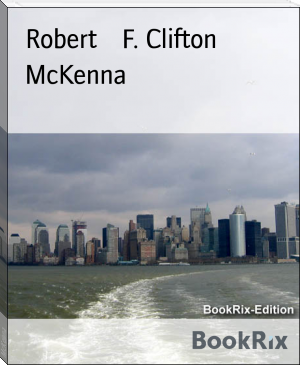McKenna - Robert F. Clifton (e novels to read online .txt) 📗

- Author: Robert F. Clifton
Book online «McKenna - Robert F. Clifton (e novels to read online .txt) 📗». Author Robert F. Clifton
McKenna
by
Robert F. Clifton
McKenna
Copyright 2015 by Robert F. Clifton
All rights reserved. No part of this book may be
reproduced or transmitted in any form or by any
means without written permission from the author.
Dedicated to the memory of
Louis Berges.
Since you went first, your job
is to find the best fishing spots up
there. I miss you Pal.
The reader is advised that this is a work of fiction. Any similarity
of names or persons, places or events contained in this book is strictly
coincidental.
R. F. Clifton
Preface
Detective Sergeant Kevin McKenna knelt down on one knee next to the victim. He was careful to avoid the small, drying puddle of blood that had hemorrhaged from the gaping wound located at the rear of the dead man's skull. It was still dark, making it difficult for him to see or gather evidence. He would wait. Sunrise was two hours away. He had to have patience. He couldn't rush. This and other things he had learned from his police officer father, Thomas McKenna and his godfather, Captain Robert Wallace.
Table of Contents
Chapter One.....Harvey Mason
Chapter Two.....The Puzzle
Chapter Three..Social Problems
Chapter Four....Speak no Evil
Chapter Five.....The Informant
Chapter Six.......Persons of Interest
Chapter Seven..Brotherly Love
Chapter Eight....Speak of The Devil
Chapter Nine.... Talons
Chapter Ten.......Song Chi
Chapter One
Harvey Mason
A cool October breeze blew in from the ocean. As it did it brought with it a misty haze that could be seen in the light given off by the street lamps that illuminated the boardwalk. It made the water vapor to appear like gold dust moving gently through the night. Occasionally a rush of air moved white grains of still dry sand across the planking, sand that would be removed at five o'clock in the morning. That was when city maintenance men arrived each day to sweep and hose away sand, dirt and peanut shells that had accumulated in front of the stores located on the wooden walkway. Boardwalk property was the most valued real estate in Nautilus Beach, New Jersey. That being so Boardwalk merchants paid high taxes. Those that rented paid two thousand dollars a frontal foot per month and that was for the tourist season and the price was considered a bargain. As a result the merchants demanded and were given extra services like the daily cleaning in front of their stores. They also demanded that city ordinances be enforced by the local police.
At one time the elite traveled from Philadelphia by train and were met at the railroad station by chauffeur driven limousines and conveyed to the beach front hotels. In the evening they strolled the boardwalk or were pushed while seated in rolling chairs, the men attired in coat and tie and the women draped in fur. That was then. This was now, October 2013 and times had changed.
Now, the homeless walked the boardwalk stopping the tourists to panhandle for money. Some lived under the boards unwashed, infested with lice or addicted to either drugs or reinforced cheap wine. It became a problem for the police to contend with. Those governing the city refused to spend funds to house, feed or tend to the homeless leaving those problems to the charitable organizations. At the same time the police didn't want those homeless who were arrested for violations of city ordinances. Housing them created a constant need to fumigate the jail cells and bedding. The result was to keep the dispossessed moving, moving away from the store fronts and customers, away from the fortunate.
At 3:37 A.M. on the morning of Tuesday, October 15, 2013
Patrolman William Hampton was on foot patrol. As usual he checked the doors of the business establishments making sure the owners or employees had locked up upon leaving. He also looked for any signs of tampering or attempts of forcible entry. At the same time he examined the large, plate glass display windows of the stores confirming to himself that they were intact. Once he did that he then left the boardwalk and where possible examined the rear of the shops.
Hampton's assigned patrol area was the six block length of boardwalk from Neptune Ave. to Poseidon Ave. It was at Poseidon Ave. that the local electric company was installing iodine vapor lights and those up and running cast a gloomy, orange glow over the boards. The patrolman left the rear of the stores and walked up the ramp to the boardwalk where he would continue his duties. He looked towards the orange light and from where he stood he was able to see something or someone laying on the walkway. He began to increase his stride, making his way to whatever was there. When he was close enough he made out the figure of a man laying face down. Once he was there and in the orange radiance Hampton could see the small, puddle of blood. Instantly, he knew there was nothing he could do to save the man. Using his flashlight he was able to see that the rear of the man's skull had been crushed. He reached for his portable radio and called into headquarters informing them of what he
had found.
Detective Kevin McKenna knelt down on one knee next to the victim. He was careful to avoid the drying puddle of blood that had hemorrhaged from the gaping wound located at the rear of the dead mans skull. It was still dark making it difficult for him to see or to gather evidence. He would wait. Sunrise was still two hours away. He had to wait. He had to have patience. He couldn't rush his investigation. That was one of the many things he had learned from his Police Officer father, Thomas McKenna and his godfather, Captain Robert Wallace. Both who had served and retired from the Nautilus Beach Police Department.
Kevin McKenna was born to Irish Catholic parents of August 1, 1989. Those who knew him and his family believed that he was destined to become a policeman. There was a rumor that on the day of his Baptism in an emergency his diaper was held together by his fathers police badge. Later, he learned his catechism from the nuns at Saint Mary's Parochial School. At Nautilus Beach High School Kevin was an excellent student and excelled in sports, particularly basketball and track. Upon graduation from high school he enrolled at Stockton State University and majored in criminology. When he graduated his father wanted him to apply to the F.B.I.. His mother wanted him to remain at home. His mother won the debate and Kevin took the civil service test for the Nautilus Beach Police Department.
Upon graduation from the police academy his father made sure that his son was assigned to the patrol division where his son walked a beat day and night for three years. There he learned the elements necessary for the career police officer. He learned how to deal with the public in a professional manner, listening to what they had to say. Showing concern for their problems large or small he developed a rapport with a number of citizens who would speak to him later in his career as he sought information.
He got lucky when after only four years in the ranks the police department held civil service examinations for promotion to the rank of sergeant and lieutenant. Kevin took the test and was number two on the qualifying list. Promoted to Sergeant he was assigned to the Major Crime Squad, a place where his father and Captain Robert Wallace had served. As a young police officer he stood at six feet tall and weighed one hundred and ninety pounds. His blue eyes and light brown hair he inherited from his mother, Molly.
Now, he stood in the orange glow of iodine vapor lights looking at the remains of a dead man who appeared to have been murdered. He waited for the sun to come up over the horizon.
Needing daylight in order to see, to gather evidence he knew that daylight also brought with it problems. He pushed the transmit button on his portable radio.
“Sergeant McKenna”, he said.
“Sergeant?”, answered the dispatcher.
“I'm going to need uniformed personnel at this crime scene for crowd control. At sun up there will be pedestrian traffic and bicycle riders”.
“Received”, said the dispatcher.
McKenna stood watching and listening to the crowd that had begun to gather. He saw the curious staring at the body and the puddle of blood. Others looked and turned away. Some questioned the uniformed officers with, “Who is he? How did he die? Who did it? Is he dead? When did it happen?” As he watched and listened the sun came up over the ocean horizon and he began to search with his eyes, looking for any sign of evidence. When it was light enough he removed a pair of latex gloves from the inside pocket of his dark blue blazer and put them on. Kneeling again he saw the clear plexiglass fragments among the blood and brain matter about eighteen inches from the feet of the victim Pointing to them McKenna said to the forensic technicians, “I want photographs of these and measurements”.
Next he saw the bulge in the dead mans rear pocket. McKenzie reached in and removed a worn, black leather wallet
Opening it he found no cash but a social security card along with identification revealing that at one time the man known as Harvey Mason had been a patient at the Veterans Hospital in Wilmington, Delaware. In addition there was the business card of the Mission House, a place where the homeless ate and slept.
Removing the small notebook he carried from his coat pocket Sergeant Mckenna wrote down the information. Now in the morning sunlight he turned towards the beach seeing the sand and small rolling waves coming in and breaking on the shore. Seagulls up with the dawn were flying low over the water searching for a meal. “The sun is coming up out of the east. The body face down is pointing north”, he wrote. Again he turned, this time seeing the store fronts and some fifty or more yards away the Regal Hotel. He made it a point to remember to talk to the night crew of the hotel. Perhaps they saw or heard something.
Sergeant McKenna waited and watched the crime scene
technicians take photographs and collect evidence. He made sure that the plexiglass fragments were gathered and secure. Finally,
he saw a fireman using a high pressure hose from a pumper wash away the blood and brains of a man once known as Harvey Mason.
McKenna used his radio again. “Sergeant McKenna”, he said.
“Go ahead Sergeant”, replied the dispatcher.
“I'm leaving the scene and will proceed to the hospital.
If you need me I'll be in the morgue”.
“Received”.
Thirty minutes later McKenna walked through the double doors of the hospital morgue and pathology department. When he did he was met by a sea of white. White walls, white tile flooring, white basins, white, painted steel gurney's and a doctor and attendant draped in white surgical gowns stood looking at him. “I'm Sergeant McKenna”, he said.
“Good morning Sergeant. I'm Doctor McIntyre. This is Randolph Cummings”, said the doctor pointing to the attendant.
McKenna nodded his head and smiled.
“I understand that there has been a murder and that the body is coming here”, said McIntyre.
“That's correct”, McKenna replied.
He just finished speaking when once again the double doors opened and a uniformed ambulance driver pushed a gurney containing a black body bag.
“Put it right here”, said the doctor.
When the stretcher was in place the driver stepped back turned and left. Doctor McIntyre unzipped the bag and took a look at the body it contained. He looked at McKenna and said,
“Whoever and whatever hit this man did it with enough force to shatter both occipital bones. When I say force I'm talking about the fact that the skull has been driven inward to the brain”.
“There was what appeared to be brain matter in





Comments (0)